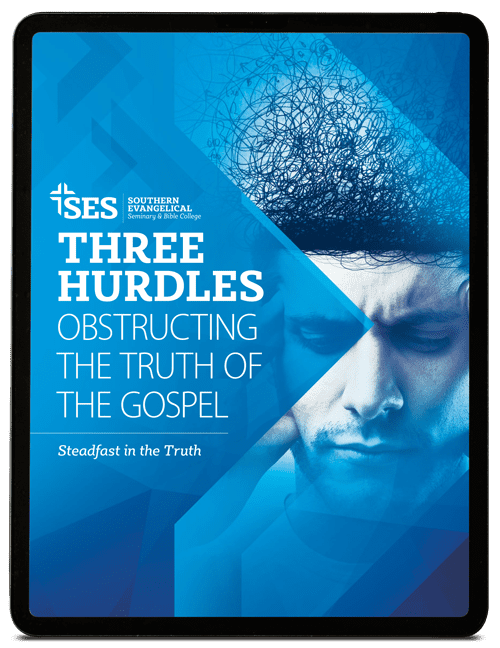A few months ago I wrote a post titled “Why Christian Apologetics Is Not A Discipline.” Dr. Robert Bowman has graciously responded with a blog post titled “Is Apologetics a Discipline?” I appreciate Bowman’s article as it highlights the importance and nature of apologetics. I have been a fan of his for well over decade since I read his and Kenneth Boa’s Faith Has Its Reasons, which is probably the best book on apologetic methodology. I also greatly appreciate his The Word-Faith Controversy: Understanding the Health and Wealth Gospel. I had the chance to Meet Rob a couple of years ago at Southern Evangelical Seminary’s National Conference on Christian Apologetics. He is incredibly friendly and courteous and I greatly appreciate his work in apologetics.
Dr. Brian Huffling
Want to see more great content from Dr. Huffling? Follow him on social media and check out his personal blog which contains even more great articles like this one!
The Importance of Apologetics
My first post on this topic argues that apologetics is not a discipline. Bowman disagrees and argues that it is. Before I respond to Bowman’s post I would like to be very clear that I am not denigrating apologetics in the least. I went to SES in 2004 to study apologetics and earned a masters degree in that area in 2009 (along with majors in Biblical Studies and Philosophy). I am currently a professor at SES and co-teach Intro to Apologetics with Norman Geisler. I have argued for years that apologetics is needed. Thus, it should be clear that I consider myself an apologist and think that doing apologetics is very important.
I also want to be clear that I do not think that one must be a specialist in order to be an effective apologist. (In my first piece I argued that to be a good apologist one must be a specialist. However, my main point there was aimed at those looking to be professionals. One can certainly be good and effective as a lay apologist; however, I do maintain that there is a risk of being over simplistic regarding complex issues as a generalist.) Most people who practice apologetics are not professional apologists, meaning that they don’t earn their living that way. Some are, though, and do very well for themselves (although I think there are few). My point in my original post was simply that if one wants to be a professional apologist, especially in academics, then he should be a specialist in a given field. I do argue and believe that pastors and lay people should practice apologetics and they don’t need to be specialists in order to do so. I have served on several church staffs and I am currently a reserve chaplain in the Air Force. We need people doing apologetics and most apologists will be bi-vocational or laymen. I am not denigrating general apologetics. It is needed. I do argue, though, that general apologetics is possible because of specialists in other fields who make their information and data available to laymen. Without specialists, there would basically be no apologetics. At least not to the level there is now.
Response to Bowman’s Article
Having said that, I stand by my original claim that apologetics is not an academic discipline; it is a practice. Let me now respond to Bowman’s post.
After summarizing my overall position, and agreeing “in general,” he makes several points. The first regards the course offerings at SES that are apologetics classes. He lists several types of classes that we offer (world religions and new religious movements, philosophy, biblical studies, etc.), focusing on the scientific classes that are offered as electives and comprise one of our certificate programs. Bowman states:
One problem with the science-related courses at SES of relevance to Huffling’s concern is that they are not intended to enable the student to become proficient in any scientific discipline. There is an apologetics course surveying science-related issues and four courses on “scientific apologetics” instructing students in intelligent design theory and objections to evolutionary theory. By no means am I criticizing these courses; my point is that if Huffling is correct, these courses are inadequate to prepare students to become good apologists. The only subject areas other than apologetics with course offerings sufficiently robust at SES to make students proficient in those areas are biblical studies and philosophy.
As I have already stated, and as Bowman admits, my concerns are really aimed at those who are trying to be full-time or professional apologists. People can certainly have a positive impact with lay-level or general apologetics training. I will say, though, that I do think that without proper training in science it is challenging to rightly understand the scientific issues relating to these topics. Yes, people can study astronomy, chemistry, and the like, and become better apologists. That is why we offer the classes. We want people to take them and learn and hopefully go on to study science at a higher level. But these are not science classes as such, they are apologetics classes. It is hoped that our students will take their knowledge from these classes and apply it to their ministries. (It is probably worth noting that it is the application of these classes to ministries and not academics that is the point of these classes. They are not scientific classes as such, and would probably not transfer to a secular school to replace an actual class on these topics. This is because these classes are not outright science classes, they are apologetics classes from a scientific point of view. They are great classes taught by excellent teachers who are scientists, such a Hugh Ross, but they are not science classes as such. I think this highlights my point that apologetics relies on disciplines for its content, but it is itself simply the application of those disciplines, such as astronomy, to defend the faith.)
Bowman then makes the correct point that “SES has a number of courses in apologetics per se—perhaps more than any other seminary. These include surveys touching on multiple disciplines but also courses on apologetic methods, the history of apologetics, and so on. These courses are not about nothing.” Agreed. In saying that apologetics is not a discipline but a practice is not to equate it with nothing.
Next he states, “A pastor or evangelist or missionary who takes a variety of these courses might indeed be well prepared to do their ministry better. Some of Huffling’s critics on Facebook made this point, and I think it is a reasonable one, though it is not directly germane to his concern regarding those seeking to be full-time apologists.” Again, agreed. I have never maintained otherwise, contrary to said Facebookers. As Bowman admits, that was not even relevant to my point in my post as I had in mind those trying to be full-time professionals.
Bowman now comes to his “main disagreement” which is my “assertion that apologetics is not a discipline.” His overall point here is that apologetics is “in the same category as philosophy, which Huffling views as a legitimate discipline.” He states,
In my view, apologetics and philosophy are both second-order disciplines. A first-order discipline concerns subject areas of human knowledge such as the sciences, the arts, and theology. A second-order discipline has as its subject or subjects other disciplines, especially first-order disciplines. For example, in philosophy one is studying philosophy of science, philosophy of language, philosophical ethics, philosophy of religion, philosophical theology, and the like.
It is not clear to me how apologetics is a second order discipline. According to Bowmans’ definition if it were then it would have as its subject other first order disciplines. Let’s take history as an example. Is history the subject of apologetics? It seems not, at least not in an exclusive way since other disciplines can as well. But for the sake of argument lets go along with this idea. When apologists use history to defend the faith they usually have in mind the reliability of the Bible or the truth of the resurrection. So then how would apologetics as a second order discipline have history as its subject here? It would look at the claims being made such as “The Bible is historically reliable” or “Jesus rose from the dead.” But the only way to proceed would be to compare the claims made with what we know about reality and can prove historically. In other words, the only way the apologist can proceed by using history in his defense is simply to claim that history is on his side. But this doesn’t seem like a second order discipline; it seems like we are simply pointing to what historians say. People point to what historians all the time and are not “doing apologetics.” Or, in the broadest sense we could say that any historical case made for something is an apologetic for that issue. But this stresses my point that apologetics is the use of a discipline to prove a point, not a discipline in itself. When someone says “X happened in history” it is hard to see how that is itself a discipline other than history.
There are aspects of philosophy that are second order; but that does not mean that philosophy as such is a second order discipline. Bowman states that he comes “down on the side of the analytic tradition in philosophy.” In defining philosophy he quotes Faith Has Its Reasons, saying, ““the task of philosophy is to clarify the meaning of knowledge claims and to assess the rationality of those claims” (168). Defining philosophy this way makes it easier to view philosophy as a second order discipline. Those like us at SES who view philosophy from a more systematic approach would not agree that philosophy as such is a second order discipline. We lament philosophy being reduced to mere linguistic analysis or simply assessing the rationality of claims. Such a view relegates philosophy to a fact checking system. Historically philosophy was more than that, and it still is in many circles. Rather than being a way to analyze statements, answer problems, or demonstrate that something is rational, philosophy has its own unique subject matter. For example, the subject of metaphysics is not something that piggybacks on other disciplines, but rather, is a discipline in itself. No other discipline inquires into the nature of being as such. Metaphysics studies the nature of existence, essences, change, and the like. This is its primary and direct subject matter. The analytic tradition that Bowman espouses rejects the rich traditions in metaphysics and relegates philosophy to mere linguistic analysis. Perhaps Bowman doesn’t mean to do this, but this is indeed the history of the analytic tradition: the rejection of metaphysics and the emptying of philosophy of its rich content. When one understands what analytic philosophy is, it is easy to see why Peter Unger titled his book Empty Ideas: A Critique of Analytic Philosophy. Only if philosophy is merely analytic in this way can it be said to be a second order discipline.
What about the “philosophy of ___________” areas? Let’s look at philosophy of religion. Again, I would argue that this is its own discipline since it has its own unique subject matter. Philosophy of religion studies God’s existence and nature, miracles, the problem of evil, religious experience, how our language relates to God (religious epistemology, or God-talk), etc. As such, philosophy of religion does not look to another discipline to do this. It has its own unique and well-defined subject matter.
There are areas in philosophy that arise out of analysis of other disciplines, such as the philosophy of math and the philosophy of science. Such fields ask about the nature of such enterprises. However, even in this case it is clear that each has its own unique and well-defined subject matter. Philosophy of math is not the same as the philosophy of science, for example.
In order to be a discipline of study a field must have its own unique and well-defined subject matter. Philosophy certainly has this, as do the “philosophy of’s.” However, this can’t be said for apologetics since it can have as its subject matter history, archaeology, chemistry, biology, physics, astronomy, philosophy, biblical studies, etc. No actual discipline has such a broad area of study. This can only be the case since apologetics requires fields of study, such as history, to defend the Christian faith. Historians practice apologetics when they use historical arguments in defense of the faith. Astronomers do apologetics when they apply their expertise to defending aspects of the faith. The same is said of all of these other disciples from which apologetics is practiced. There is no such thing as “mere apologetics.” Whenever someone tries to defend the faith, he is always doing it by practicing some field of study.
Bowman next claims, “Philosophy and apologetics can even involve the study of one another: much of philosophy of religion examines apologetic arguments for specific religious beliefs, and philosophical apologetics is itself a type of apologetics.” It is not at all clear how apologetics studies philosophy. I am also not clear as to what arguments he is referring to, but I’m assuming theistic proofs for God’s existence, the problem of evil, the nature and possibility of miracles, etc. It seems that he is referring to this when he refers to philosophical apologetics as a type of apologetics. Rather than philosophy of religion examining apologetic arguments, there are arguments used in defense of our faith that are philosophical in nature. These arguments come from applying philosophy to our faith. Without the philosophy of religion there would simply be no apologetic arguments in this regard. Philosophical apologetics is nothing more than the application of philosophy to Christianity. Philosophers aren’t examining apologetic arguments, philosophers are making apologetic arguments by applying philosophy to a defense of the faith. This is a one way street as philosophers can make and examine apologetic arguments, but apologists cannot make and examine philosophical arguments without using philosophy.
Next, Bowman writes, “My point is that philosophy and apologetics are both disciplines in their own right that study how to think about knowledge claims in other, more specific disciplines.” It is not overly clear what Bowman means by “knowledge claims.” Does he mean studying the nature of knowledge and the knowing process? Such would be epistemology. Does he mean seeking to find the truth value of a given claim or testing worldviews? In short, apologetics does not study how to think about knowledge claims. Philosophy studies the nature of knowledge and any discipline can be used to check the veracity of a given proposition that falls in its domain. It is not unique to apologetics and I don’t think it makes sense to say apologetics does this. Checking a truth claim against reality is not unique to apologetics; it is something that everyone does. Such a claim, if this is what Bowman has in mind, seems to prove too much as then everything would be apologetics.
Finally, Bowman declares, “It is true, as Huffling points out, that most universities and other schools have teaching positions in philosophy but not in apologetics. This fact might be a good pragmatic reason not to pursue a major in apologetics per se, if one’s goal is an appointment to a full-time faculty position somewhere. However, it is not a good argument against recognizing apologetics as a discipline.” I agree that this is a pragmatic reason not to major in apologetics if one wants to be an academics. However, it may be a good degree for other reasons. My position that apologetics is not a discipline does not derive from the fact that schools don’t have teaching positions in it. My argument is that apologetics does not have its own unique and well-defined body of knowledge. It uses actual disciplines from which to defend the faith. The fact that schools don’t have positions in apologetics is evidence of my claim but was not my argument for it.
Conclusion
I would like to thank Rob for spending the time interacting with my article. I was surprised he thought it worthy of mention! Apologetics is indeed important, even at the lay-level. We do need generalists and we need apologetics taught in churches and para-church ministries. However, apologetics relies on the expertise of scholars in well-defined disciplines. This is not a negative quality for apologetics. It is simply how reasoning works. The fact that apologetics is based on specialists and scholars in various fields should give us confidence in our apologetic endeavors. Shouldn’t we want specialists defending the faith and telling us how secure the foundation for our beliefs is rather than relying on generalists? The generalist approach has its merits and appropriate venues, but apologetics as such is secured by specialists who are experts in solid and well-defined disciplines.












